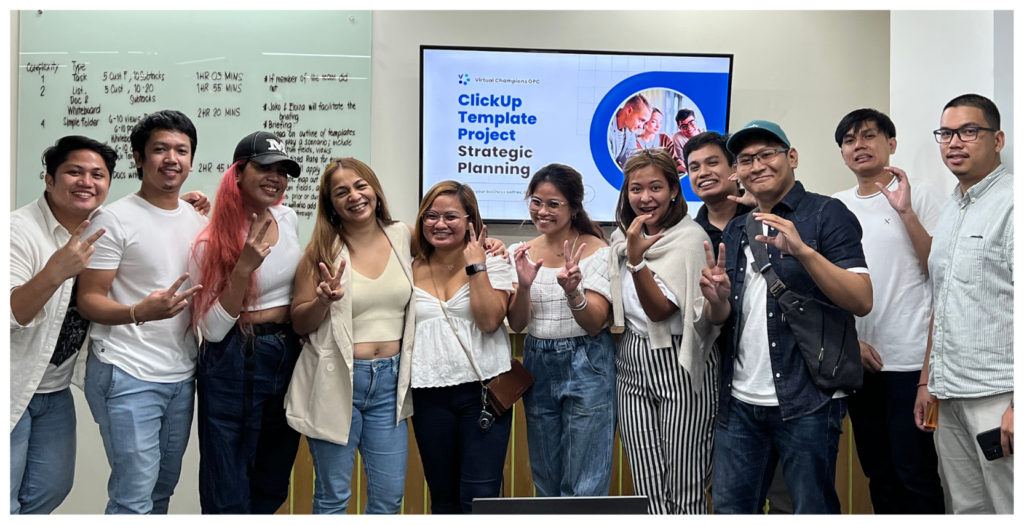Effective Leadership Qualities for Startup Success

By Eloiza Mariano Serate
As the founder of Virtual Champions PH and a seasoned business consultant, I have explored diverse leadership styles in the startup arena.
Working with different leaders, I’ve come to realize the critical role played by certain key qualities in a leader’s arsenal.
With all these experiences in mind, I discovered the pillars of effective leadership. These are empathy, integrity, resilience, and kindness.
In this blog, we’ll explore how these key pillars influence effectiveness in leadership. Read along to find out the profound impact of each key pillar in the success of your business.
Empathy: The Heart of Emotional Intelligence

Empathy is vital for leaders who aim to genuinely connect with their team members and understand their needs. This key trait is at the core of emotional intelligence. If you’re handling people, this key trait is essential to empower them towards success.
The practice of active listening and effective communication fosters a culture where team members feel valued and understood.
Businessolver’s 2020 report underscores that 82% of CEOs link empathy directly to their company’s financial success. The study suggests that empathy is essential for maintaining a competitive advantage in the business landscape.
Tips for Exercising Empathy:
● Encourage Open Dialogue: Begin team meetings with a quick personal update from each member. For example, a startup like Zapier encourages dialogue by having “Friday Updates” where team members share both professional progress and personal anecdotes.
● Customer Feedback Sessions: Organize monthly feedback webinars where customers can discuss your product’s impact on their business, much like how Slack hosts user roundtables to gather direct user feedback and suggestions.
● Empathy Training: Host workshops on emotional intelligence using platforms like Coursera or Udemy, which offer courses specifically tailored for workplace communication and empathy.

Workshops are a great way to engage your team members to exercise empathy. As a fully remote team, we make sure that we have moments like this so every single team member still feels connected to each other.
Integrity: The Foundation of Trust

Building trust within a startup is paramount, as trust influences every interaction, decision, and strategic move a company makes.
The 2019 Edelman Trust Barometer reveals that 81% of consumers consider trust a decisive factor in their purchasing decisions.
For startup leaders, displaying integrity helps in building lasting relationships with customers and team members alike. Transparency and ethics should always be the driving force of any business decision that you make as a leader.
Tips for Strengthening Integrity:
● Be Transparent in Decision-Making: Share the reasons behind major decisions in a monthly newsletter or a dedicated Slack channel. This is similar to how Buffer openly shares its decision-making processes through regular blog posts.
● Build a Value-Driven Culture: Define core values and revisit these values regularly to ensure they align with your operations. This is akin to how Airbnb regularly evaluates its core values against company activities.
● Admit Mistakes: Follow the example of leaders like Elon Musk, who publicly admits and addresses mistakes on platforms such as X. This shows accountability and encourages a transparent culture.

Transparency in decision making and strategy planning.
Resilience: Key to Navigating Challenges

Resilience allows leaders to steer their startups through volatile markets and unpredictable challenges.
According to Harvard Business review, approximately 75% of startups fail. This is often due to premature scaling or not meeting market needs. Failure is inevitable – this is why the ability to bounce back from setbacks is invaluable.
Resilience in leadership fosters a team’s ability to remain optimistic and driven, even when faced with potential failure.
Tips in building resilience:
● Regular Strategy Reviews: Implement quarterly strategy review sessions where you assess what’s effective and what isn’t. This is similar to the approach used by Amazon to evaluate and adapt its business strategies regularly.
● Stress Management Workshops: Offer mindfulness and yoga sessions facilitated by platforms like Headspace or Calm. These are specifically designed to reduce workplace stress.
● Celebrate Learning from Failures: Host a “Fail Fest” where team members share their biggest setbacks and the lessons learned. This creates a supportive atmosphere that values growth. This is much like FailCon, a conference for startup founders to study their own and others’ failures and prepare for success.

A sound mind is key to a resilient heart
Kindness: The Apex of All Forms of Intelligence

Kindness is perhaps the most underrated leadership trait that can lead a team to success. It involves recognizing the strengths and weaknesses of team members and guiding them to leverage their strengths effectively.
This trait, rooted in emotional intelligence, enhances team cooperation and boosts morale, leading to higher productivity and innovation.
Kindness in leadership helps in nurturing a supportive and inclusive work environment. It encourages team members to come forward with good ideas and creative solutions.
Tips to inspire kindness:
● Mentorship Programs: Pair new hires with experienced employees. This is as seen at Google, where formal mentorship helps new staff integrate faster and feel supported.
● Flexible Working Arrangements: A good example of this is at Dropbox. The company offers “non-linear workdays”. This allow team members to choose their working hours to better fit their personal lives. This initiative shows consideration for their outside commitments.
● Team Building Activities: Plan regular non-work-related outings such as virtual escape rooms or cooking classes. These can help teams bond over shared experiences, similar to what Zappos does to foster a strong company culture.

Leadership Development: Building Essential Skills
Effective leaders understand the importance of constantly working on developing their leadership skills.
Leadership development involves learning how to lead a team effectively, ensuring good communication, and fostering a culture where every team member can thrive.
One of the modern leaders I currently follow is Simon Sinek. A proponent of effective leadership, he emphasizes the significance of putting people first. He advocates that leadership is not just about being in charge but about taking care of those in your charge.
The journey of mastering the qualities of a good leader is continuous and demands commitment to leadership development.
Embracing these leadership traits can make the difference between failure and success.
📞 Are you ready to take your business to the next level? Click the link below to book a call with us and discover how our services can help you win your business battles. 🚀
Let’s have a conversation and get the best Virtual Champion for you!
Want to hear the latest news about Virtual Champions PH?
This could be the start of something awesome! Subscribe to our newsletter. Stay updated with exclusive tips, articles, new product tools and notifications, as well as special service offers from VCPH conveniently in your inbox!
